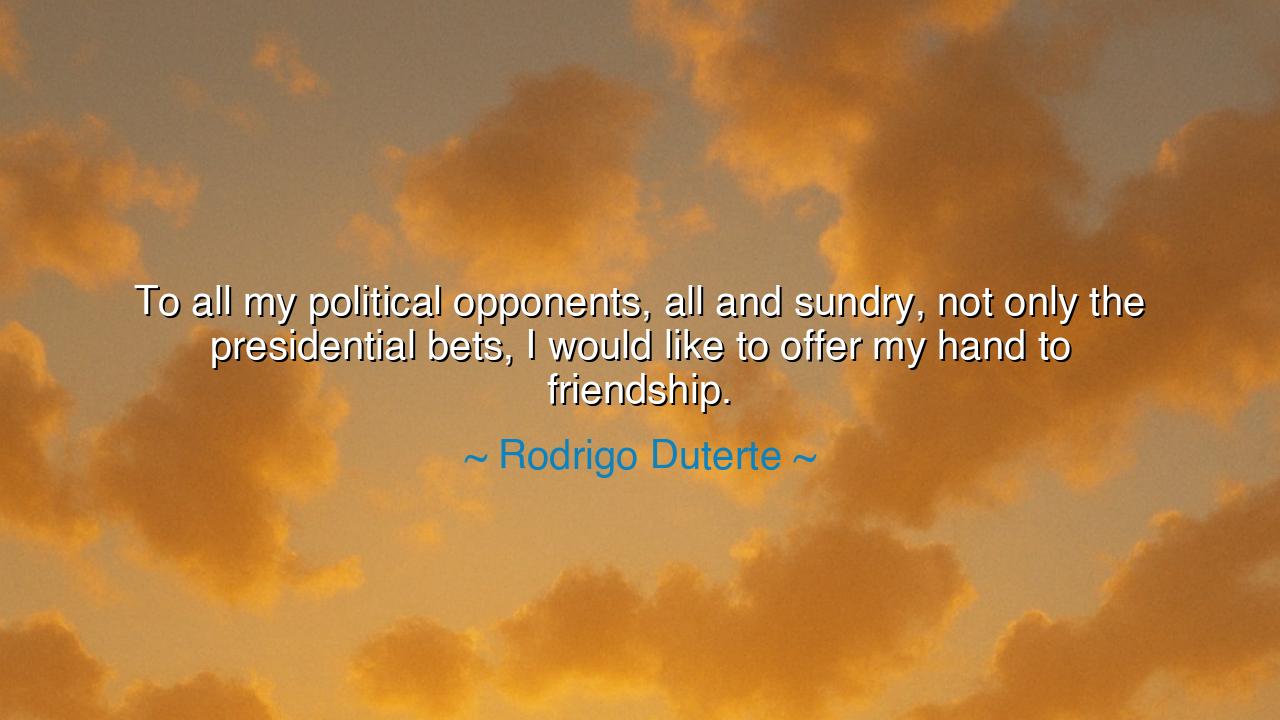
To all my political opponents, all and sundry, not only the
To all my political opponents, all and sundry, not only the presidential bets, I would like to offer my hand to friendship.






"To all my political opponents, all and sundry, not only the presidential bets, I would like to offer my hand to friendship." These words from Rodrigo Duterte, the former president of the Philippines, echo through the chambers of power, resonating not just within the halls of politics, but within the hearts of all who seek reconciliation and unity after division. At first glance, it might seem strange to extend the hand of friendship to those who have stood in opposition, those whose paths have crossed with yours only in the heat of conflict. But upon closer examination, we find that this gesture is one that calls forth the deepest traditions of wisdom and leadership, speaking to the very nature of political and personal relationships.
In the ancient world, rulers and warriors alike were often faced with the challenge of reconciling after a fierce battle—whether on the field or in the political arena. The Romans, for example, were no strangers to internal strife and division. Even the most celebrated leaders, such as Julius Caesar and Pompey, had once stood as allies, only to become bitter enemies. Yet, the Roman practice of forgiving rivals and seeking alliances was not without its own philosophy. The great Cicero, in his letters and speeches, often spoke of the need for unity in times of political strife, encouraging his fellow citizens to extend the olive branch, to seek peace, even when the path seemed fraught with distrust. In a world where political opponents could turn into powerful allies or bitter enemies, Cicero believed that a leader’s true strength lay in the ability to forgive and reconcile, to turn division into a source of strength.
It is not only in ancient texts where we find such wisdom, but also in the great struggles of the modern world. Nelson Mandela, after spending 27 years in prison, emerged not with a heart filled with vengeance but with the wisdom of one who understood the power of forgiveness. He knew that the true path to healing a fractured nation lay in extending the hand of friendship to those who had once been his oppressors. The Truth and Reconciliation Commission he led was a monumental step in showing that political opponents could become partners in the pursuit of a greater good. In this, Mandela exemplified the same noble intent behind Duterte's call for unity and reconciliation—the understanding that, in order to move forward, one must sometimes bury the hatchet and seek mutual respect, even among those who once opposed you.
Duterte's words are a reminder that leadership is not about winning a single battle but about navigating the long arc of history. True strength, he suggests, is not in defeating your opponents but in extending friendship and fostering understanding. This is the path of the wise ruler, the one who seeks not to deepen division, but to heal the wounds of the past. Friendship, then, becomes the bridge between rivals, a bridge that can span the chasm of anger and discord that often separates those with differing beliefs. It is a bridge that has been walked by the greatest leaders of history, from Cyrus the Great to Abraham Lincoln, both of whom sought not just to conquer but to reconcile their enemies for the good of their people.
Yet, the act of extending the hand of friendship is not one that is always readily accepted, nor is it free from difficulty. In the tumultuous world of politics, where ambition, pride, and fear often cloud the hearts of men, the gesture of peace can be met with skepticism. One must be steadfast, for Duterte's words are a call to action—an invitation not just to speak of unity but to live it. It is easy to extend one's hand when the winds of victory blow in one's favor, but the true test of a leader lies in extending friendship even when the battle has been long and hard, and the wounds still fresh.
From Duterte's call to his opponents, we learn that leadership is ultimately about the future. The true measure of a leader’s legacy is not found in the number of battles won or enemies vanquished, but in the ability to bring together a people who have been torn apart by division. Friendship between political opponents is not only a moral gesture; it is a practical one. When enemies become allies, the strength of the nation, the community, or the organization is multiplied. It is only through cooperation, through mutual respect and shared goals, that true progress can be achieved.
As we consider these lessons, let us reflect on our own lives and the divisions we face. Whether in the workplace, in our families, or in our communities, we often find ourselves at odds with those who do not share our views. But the wisdom of Duterte, like that of Mandela and the ancient philosophers, calls us to a higher purpose. We must remember that in the end, the highest honor is not in defeating our adversaries, but in extending the hand of friendship to them, seeking to reconcile, to build something stronger from the ruins of conflict. Let us carry this wisdom forward, and let our lives reflect the peace that can only come when we choose to embrace our opponents not as enemies, but as partners in the shared struggle for a better world.






AAdministratorAdministrator
Welcome, honored guests. Please leave a comment, we will respond soon